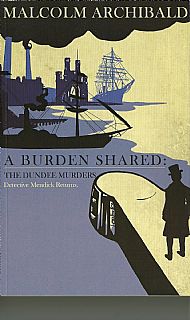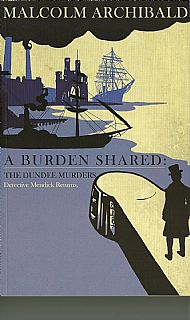Good day to you all,
Sergeant James Mendick of the Yard here. I have been busy for the past few months, chasing pirates and a Daughter-of-the Gun half way across the world. This new discovery of gold in the colonies is causing all sorts of problems, don’t you know. Half the riff-raff of the world are descending on that hot country, with God-alone knows what consequences. At any rate I have written my report on that particular matter and it will be released to the world in the spring of next year, God willing. Although what the good Lord has to do with it I am sure I don’t know.
In the meantime I will talk about the crimes that women get involved in. Rather than cover the entire Empire, I will concentrate on one city: Dundee, that Sink of Atrocity as the High Court judge Lord Cockburn to accurately described it.
You may not know Dundee, well, it is an industrial town on the east coast of Scotland, known for its mills and its docks. As an ex-seaman myself I know exactly what sort of men go to sea, and what type of women wait for them when they land. Not the long-suffering wives, but the other sort, the fly-by-nights and street haunting whores that infest every dock area in the world. Dundee has its quota of them, especially in the Couttie’s Wynd area.
Couttie’s Wynd is too narrow a street to attract many respectable people and it’s a place of prostitution and drunkenness. In September 1861 Frederick Leverdowitz the master of the barque Lavinia of Libau visited one of the houses and came out minus a gold watch and chain and £90 in cash, which is a huge sum. The man was a fool to carry so much – that’s near as dammit to two years’ wages for a labourer. He came howling into the police office with his story and the local bluebottles buzzed around to catch the thieves. We arrested three suspects, Catherine Grant, Catherine Hughes and her husband John Hughes. Catherine Grant, officially a millworker, was sent to jail for sixty days while the husband and wife team were eventually given longer sentences. Not long enough though, damn their thieving hides.
There are other areas of Dundee with nearly as interesting a reputation including Fish Street, square in the heart of the old Maritime Quarter. At one time Fish Street had been the home of some of Dundee’s elite but at the beginning of September 1824 three English seamen were at large in Fish Street when a trio of local ladies took them in hand. With promises of great favours they helped the seamen into one of the low houses and departed with the Englishmen’s money. Bloody fools! Take a lesson from that all you bold boys who think you can go where you like: a Dundee woman will beguile you with her eyes, entice you with her body and rob you with her hands. Think on!
Every city has some places that could have been made specifically for crime, and the Little Close in Dundee was one such. It runs between Blackness Road and the Hawkhill, a narrow, dark and airless passage, stickily hot in summer when flies feasted on the sundry dung heaps, slippery and chill in winter when fog and frost beset the traveller. At all seasons it’s dark, and with so little elbow room that two people could not pass each other unless one pressed against the wall. About half way down the close, the gable end of a single house formed part of the wall, and in here lived a family who terrorised the lane and the fear of whom deterred travellers from using this passageway unless in full daylight.
There were four of them; James Greig and his wife Helen Nicoll, her brother James Nicoll and their sister Margaret Nicoll. Of them all, Margaret Nicoll was the worst. She was the mainspring of the group, a woman who constantly abused her neighbours verbally or with violence and who had appeared before the Police Court on a number of occasions. Yet although the Nicolls controlled the house, the Little Close and much of the neighbourhood, they did not own the house and neither were they even the tenants. Margaret Nicoll was the servant of the owner, an unmarried man who seemed not to care what she did, and she had brought in her relatives to rule her employer’s house. From that time onward Margaret Nicoll was the real Mistress of the house. A classic case of a servant controlling the mistress: absolutely abhorrent and against the natural order.
On Saturday the 5th October 1833 John Murray, a rope maker, was walking along the Close when he heard Margaret’s voice: ‘Now Greig, give the bugger law!’ and two people attacked him. It was half past ten at night, and as dark and miserable as October can be, but Murray defended himself so effectively that he beat Greig off and made Margaret back away.
‘It’s all a mistake,’ Margaret assured him, and offered to take Murray into his house so he could have his wounds treated. More trusting than worldly, Murray agreed, and stepped inside the house, only to once again hear the words: ‘give the bugger law’ and the whole pack of Nicolls attacked him. Helen Nicoll cracked him over the head with the large house key, temporarily dazing him. Struggling free, he crashed against the gate, which burst open and he fell into the Close, followed by the howling mob. When a man loomed through the dark, Murray must have felt some relief, but it was Greig returning and they grappled together, until another rush from the Nicolls pushed Murray back. For a moment Murray thought his life was in danger, with one of the assailants attempting to ‘Burke’ or smother him, and he was about to be overcome when another man, James Macintosh, appeared and immediately helped him; between the two they rushed Greig and Helen Nicoll along the close and handed them to the police.
The next morning Greig made his confession and put all the blame on his sister-in-law, Margaret Nicoll. Both he and Helen was sent to jail for sixty days and the police made a quick raid on the Nicoll’s house, arresting Margaret as she worked in the garden. Her arrest was something of a public spectacle, as all her neighbours turned out to watch, together with many of the decent people of Hawkhill and Overgate who had suffered at her tongue and hands. She was also given 60 days, which was the maximum amount the Police Court could impose. Bailie Christie also warned the police to keep a close eye on ‘that abominable establishment’ before somebody was murdered in the close.
When Lord Cockburn said: ‘What a set of she-devils were before us!’ he was referring to the Dundee women who were dragged, often kicking and swearing, before the bar of the Circuit Court, but Margaret Nicol was only one of a long line of Dundee women who were at least as dangerous as their menfolk, and they pepper the annals of nineteenth century crime in the city. Often they took out their aggression on each other, as in the case of the face-to-face battle of two women at Dallfield Walk in April 1824, when the stronger used a poker to batter her opponent into bloody submission. A similar case occurred in April 1830 when Elizabeth Savage attacked Rose Montgomery in her own house in Hawkhill. In this instance the women had shared a single man, and when he chose to marry Montgomery, Savage lived up to her name and responded by attacking her rival. When this case came to court, Montgomery shouted at her ex-lover, calling him a ‘jackdaw’ and vowing to torment him at every opportunity. She was still screaming and threatening when she was dragged away to the cells.
Elizabeth Savage had some justification for her assault, as her trust had been abused and her man stolen from her, but in the case of Williamina Thomson, the only reason was theft. Thomson was a young woman, still in her teens and on the 16th of June 1878 in Watson’s Lane, she ambushed Ann McGillivray, or Ann Banks in Wilkie’s Lane. Mrs Banks was a much older woman, perhaps in her fifties, and she was walking through Watson’s Lane in the early hours of the morning when Thomson came up from behind her and asked if she knew a good place for a dram. When Mrs Banks said she did not know, Thomson put an arm around her neck and wrestled her to the ground. Kneeling on her breast, Thomson slapped Mrs Banks’ face and rifled her pockets. The spoil was really not worth the effort for Mrs Banks only had three farthings, a snuff box and a small bottle with a gill of whisky. When Mrs Banks screamed for help, a flaxdresser named Charles Lamb ran up and demanded to know what was happening.
‘Come come,’ Lamb said, ‘what are you doing?’
‘Mannie,’ Thomson said, ‘It’s my mother, and I’ll learn her not to go about and spend my money!’ She continued, saying that her mother had gone off with her father’s wages and there was no food left in the house.
Lamb nodded; it was not an uncommon situation for a wife to squander her man’s wages on drink and he had no intention of interfering in a domestic squabble. He left, and as soon as the echoes of his feet faded, Thomson rolled off her victim, landed a hefty kick and told her to go home.
Thomson was not the cleverest of thieves. After her failure to steal a respectable haul, she remained in the same area, so when Mrs Banks complained to the police, she was arrested that same day and hauled into the Police Office. As well as Charles Lamb, a weaver named Elizabeth Kennedy had witnessed the assault, and when her case came to trial in September 1878, Lord Mure sent her to jail for 18 months.
These were only a few examples of the women of Dundee. I have one of the most savage in my memoirs: A Burden Shared, published by Fledgling Press, and others in A Sink of Atrocity, published by Black and White.
Walk safely now
James Mendick
http://www.malcolmarchibald.com



